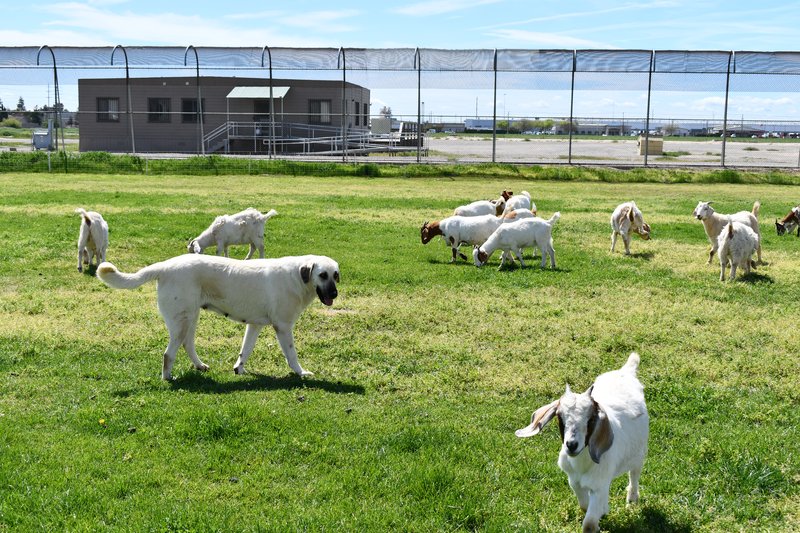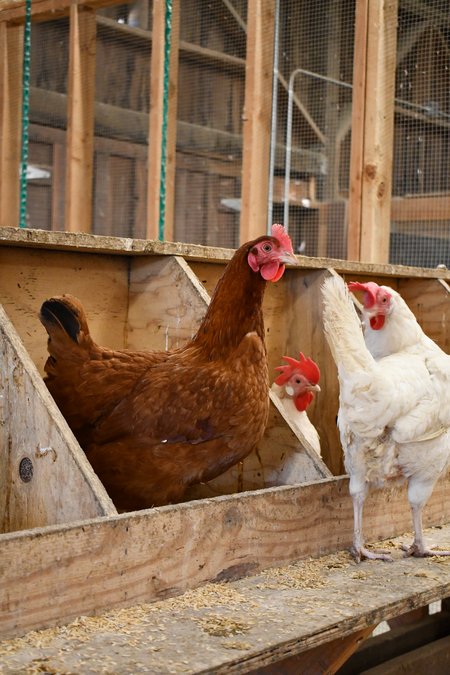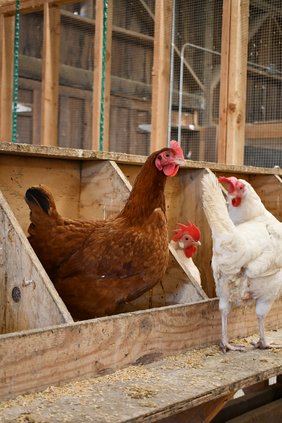BY ANNA GENASCI
Special to the Journal
I went to jail last week. Yes, you read that right. Well, I actually visited jail. I thought I would spend an hour or so meeting with the Sheriff and members on his team to discuss the new laying hen and goat facilities. But, what transpired was three hours with the Lieutenant and Deputy who are really trying to make a difference.
I have always believed that agriculture was special and that the people working with animals and in the soil have the best job in the world. But it's more than that. Working with animals and having responsibility for something beyond yourself can be transformative.
Over a year ago, the Sheriff was at a conference where he learned more about the 11,000 acre farm in Tulare County Jail. Sheriff Jeff Dirkse thought to himself, “what can we do with the space that we have?” While they don't have 11,000 acres to work with, they do have room enough for a chicken coop and a goat barn.
About a year ago, Lieutenant Timothy Burns and Deputy Mack Quillen, tested their agricultural skills, piloting 20 laying hens — their version of an inmate operated farm.
Lieutenant Burns has been with the Sheriff's Department for about 17 years while Deputy Quillen just the last 6, having had an entire career previously in the construction business. Those skills have come in handy starting the farm with a coop for the chickens.
Now keep in mind, these gentlemen aren't farmers by trade and had to learn the ins and outs of caring for the animals before bringing in inmates and training them.

“The agriculture community has been very supportive,” shared Lieutenant Burns. “We got help from companies like JS West and Foster Farms, and they even donated some of the supplies.”
The 20 laying hens quickly grew to 150 as the program became a favorite of inmates who are serving their time in the REACT Center and meet the qualifications for the program.
The REACT (Re-Entry and Enhanced Alternative to Custody Training) Center is a 51,000 sf complex located within the 127-acre Stanislaus County Public Safety Center site. The REACT consists of two separate buildings connected by a courtyard.
The goal of the REACT Center is to reduce recidivism, the tendency of a convicted criminal to reoffend. Lieutenant Burns shared, “we want hands-on activities and education. Agriculture is big in this community. Hopefully we're planting a seed of interest that can lead to meaningful employment and open doors for them down the road.”
Deputy Quillen oversees the program on a daily basis and shared that both male and female inmates enjoy the program. “They love it. They collect the eggs, they wash them, they clean the nesting boxes and feed and water the birds daily. It's time outside of the unit, it's time outside and I see them taking ownership and pride while they learn to care for these animals,” said Quillen.
The eggs are collected daily and hard-boiled in the kitchen and made available to inmates and staff. As the chickens became popular the team decided to dabble in the goat business.
Now, you may know that our Stanislaus County Sheriff is Jeff Dirkse and that he also serves as a coroner. But did you know he is also Director of OES?
And this is where the goats come in. Goats can be a useful resource for fire abatement. They're called ‘nature's lawnmowers’ for a reason. Goats are hungry, agile, and far from picky. Across California, herds of goats are being used to prevent wildfires. The Sheriff will use them for weed abatement on county property.
Sheriff Dirkse shared that the goats “haven't been deployed yet,” but they are already a favorite part of REACT’s program. Right now, the goats enjoy the comforts of a cozy barn and fields for grazing cared for by the inmates.
Of course while visiting, I got to meet the chickens, the goats and Kizi, the Anatolian Shepherd goat-guard-dog.
Deputy Quillen built a portable water station and the goats travel with fencing to keep them in the area that needs some pruning.
Like the chickens, inmates are responsible for their care, feeding, checking water, providing supplements and minerals, and checking their hooves.
The animal units are not the only opportunities made available for inmates serving in the REACT Center. There is an on-site welding program, landscaping and inmates can serve on the graffiti abatement team and roadside pickup. They can learn to operate tractors, lawn mowers, and skid steers. The philosophy is, keep them busy, build their skills, and keep them learning.
While many jails and prisons have programs for inmates, the REACT Center has a one-to-one ratio. Lieutenant Burns explained that for every bed in the Center, there is a corresponding chair in a classroom for an inmate to participate in a program.
These programs allow inmates time outside Monday through Friday, multiple times a day, to care for these animals.
During my visit, I was given the opportunity to speak with two female inmates who are active participants in the laying hen and goat programs.
Per their request, I will not share their names, but I will share their comments about the programs.
“It teaches responsibility and I love being outside; it's a good program. It teaches me how to take care of the animals, how to work with tools - something to look forward to. This county really tries to help you. I worked as a ranch hand at one time and I really like working with the goats, I have a favorite one.”
Having just visited the goats I knew exactly the one she meant, the super friendly one who wanted to nibble the cuffs of my jeans.
She also shared that she has completed a Microsoft office program and is a member of the WOW group, ‘Women of Wisdom.’
Well she may have loved the goats. The other inmate I spoke with really enjoys the chickens.
“I have no farming background, but I do love animals and now I know I could do this. I love working with the chickens. There's more to do than with the goats.”
She also shared with pride that she had finished the ACCI packets, a self-paced educational program that results in a certificate.
So, what do next steps look like? Lieutenant Burns shared that someday, down the road, he would love to see a super garden, but likes to take on these projects slowly and do it right.
I must say that doing this interview was impactful. It solidified my belief that working with animals and the soil can truly be transformative. I saw the look on the inmates’ faces as they spoke with pride about these animal programs, where they get to care for these animals.
And the other key takeaway. People like Lieutenant Burns, Deputy Quillen and the Sheriff are truly trying to give these folks a chance at meaningful employment after serving their time. The ultimate goal is to never see these inmates back in custody again.
A huge thank you to Lieutenant Burns and Deputy Quillen for spending a better part of their day with me, talking about the program and sharing the amazing programs they are making happen!
— Anna Genasci is the Communication and Education Director for the Stanislaus County Farm Bureau.





